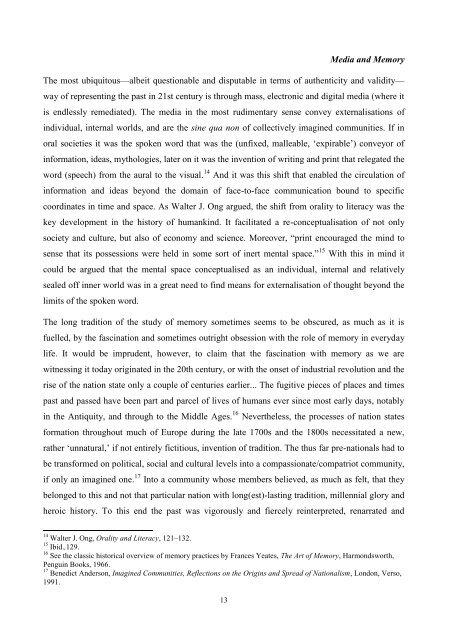UNIVERSITY OF NOVA GORICA GRADUATE SCHOOL ...
UNIVERSITY OF NOVA GORICA GRADUATE SCHOOL ...
UNIVERSITY OF NOVA GORICA GRADUATE SCHOOL ...
Create successful ePaper yourself
Turn your PDF publications into a flip-book with our unique Google optimized e-Paper software.
Media and Memory<br />
The most ubiquitous—albeit questionable and disputable in terms of authenticity and validity—<br />
way of representing the past in 21st century is through mass, electronic and digital media (where it<br />
is endlessly remediated). The media in the most rudimentary sense convey externalisations of<br />
individual, internal worlds, and are the sine qua non of collectively imagined communities. If in<br />
oral societies it was the spoken word that was the (unfixed, malleable, ‗expirable‘) conveyor of<br />
information, ideas, mythologies, later on it was the invention of writing and print that relegated the<br />
word (speech) from the aural to the visual. 14 And it was this shift that enabled the circulation of<br />
information and ideas beyond the domain of face-to-face communication bound to specific<br />
coordinates in time and space. As Walter J. Ong argued, the shift from orality to literacy was the<br />
key development in the history of humankind. It facilitated a re-conceptualisation of not only<br />
society and culture, but also of economy and science. Moreover, ―print encouraged the mind to<br />
sense that its possessions were held in some sort of inert mental space.‖ 15 With this in mind it<br />
could be argued that the mental space conceptualised as an individual, internal and relatively<br />
sealed off inner world was in a great need to find means for externalisation of thought beyond the<br />
limits of the spoken word.<br />
The long tradition of the study of memory sometimes seems to be obscured, as much as it is<br />
fuelled, by the fascination and sometimes outright obsession with the role of memory in everyday<br />
life. It would be imprudent, however, to claim that the fascination with memory as we are<br />
witnessing it today originated in the 20th century, or with the onset of industrial revolution and the<br />
rise of the nation state only a couple of centuries earlier... The fugitive pieces of places and times<br />
past and passed have been part and parcel of lives of humans ever since most early days, notably<br />
in the Antiquity, and through to the Middle Ages. 16 Nevertheless, the processes of nation states<br />
formation throughout much of Europe during the late 1700s and the 1800s necessitated a new,<br />
rather ‗unnatural,‘ if not entirely fictitious, invention of tradition. The thus far pre-nationals had to<br />
be transformed on political, social and cultural levels into a compassionate/compatriot community,<br />
if only an imagined one. 17 Into a community whose members believed, as much as felt, that they<br />
belonged to this and not that particular nation with long(est)-lasting tradition, millennial glory and<br />
heroic history. To this end the past was vigorously and fiercely reinterpreted, renarrated and<br />
14 Walter J. Ong, Orality and Literacy, 121–132.<br />
15 Ibid.,129.<br />
16 See the classic historical overview of memory practices by Frances Yeates, The Art of Memory, Harmondsworth,<br />
Penguin Books, 1966.<br />
17 Benedict Anderson, Imagined Communities, Reflections on the Origins and Spread of Nationalism, London, Verso,<br />
1991.<br />
13

















